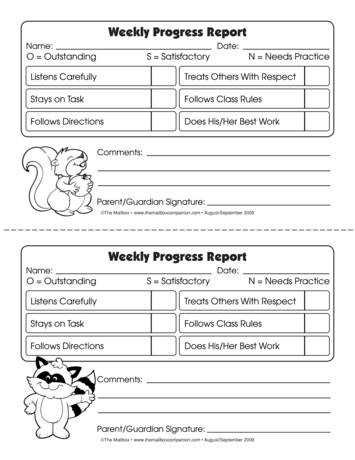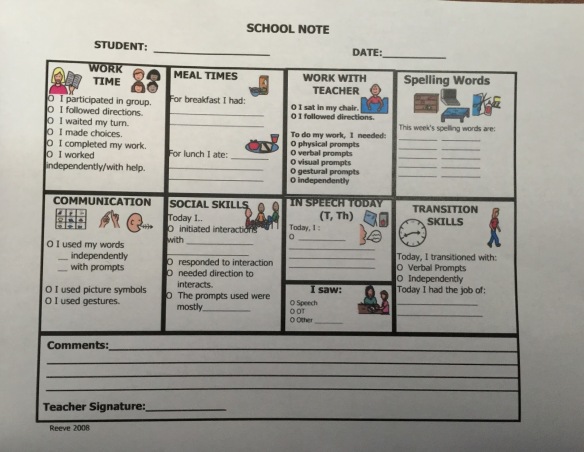Home school communication a great tool in working with challenging behavior. Parents often hold the keys to change.
Here are some examples:
Look at examples on pages 35-37
Principles and examples of home school communication from PENT: here
More examples of blank templates: here and here
Articles:
11 Rules for Better Parent-Teacher Teamwork
Sharing Data to Create Stronger Parent Partnerships
Visually readable progress reports
Simple:

To more involved:

Daily Behavior Report Cards (DBRC)
Ongoing communication between home and school is an important component to behavior plans. DBRCs can be a very easy, efficient and helpful way of motivating students as well as informally monitoring behavioral improvement with intervention. Teacher behavior report cards can be designed to accomplish the following:
- Point out to the students behaviors that they need to learn (skill deficit).
- Provide a schedule of teacher attention/feedback for positive behaviors.
- Motivate students through reinforcing positive behavior that teachers want to increase, and providing consequences (e.g., a sad face) for negative behaviors they want to decrease.
- Increase home-school communication (increase accountability with additional opportunities for positive or negative consequences for behavior).
- Evaluate whether the intervention is working or not when used with other measures.
Top Five Reasons to Engage Parents
1. Decades of research show when parents are involved students have:
- – Higher grades, test scores, and graduation rates
- – Better school attendance – Increased motivation, better self-esteem
- – Lower rates of suspension
- – Decreased use of drugs and alcohol
- – Fewer instances of violent behavior
National Parent Teacher Association
2. Family participation in education is twice as predictive of students’ academic success as family socioeconomic status. Some of the more intensive programs had effects that were 10 times greater than other factors. Walberg (1984) in his review of 29 studies of school–parent programs.
3. School Benefits:
- – Improves teacher morale
- – Higher ratings of teachers by parents
- – More support from families
- – Higher student achievement
- – Better reputations in the community
A New Generation of Evidence: The Family is Critical to Student Achievement, edited by Anne T. Henderson and Nancy Berla, Center for Law and Education, Washington, D.C., 1994 (third printing, 1996)
4. Parent involvement leads to feelings of ownership, resulting in increased support of schools. Davies, Don. (1988). Low Income Parents and the Schools: A Research Report and a Plan for Action. Equity and Choice 4,3 (Spring): 51-57. EJ 374 512.
5. Parents express a genuine and deep-seated desire to help their children succeed academically, regardless of differences in socioeconomic status, race, ethnicity, and cultural background. Mapp (1999)

